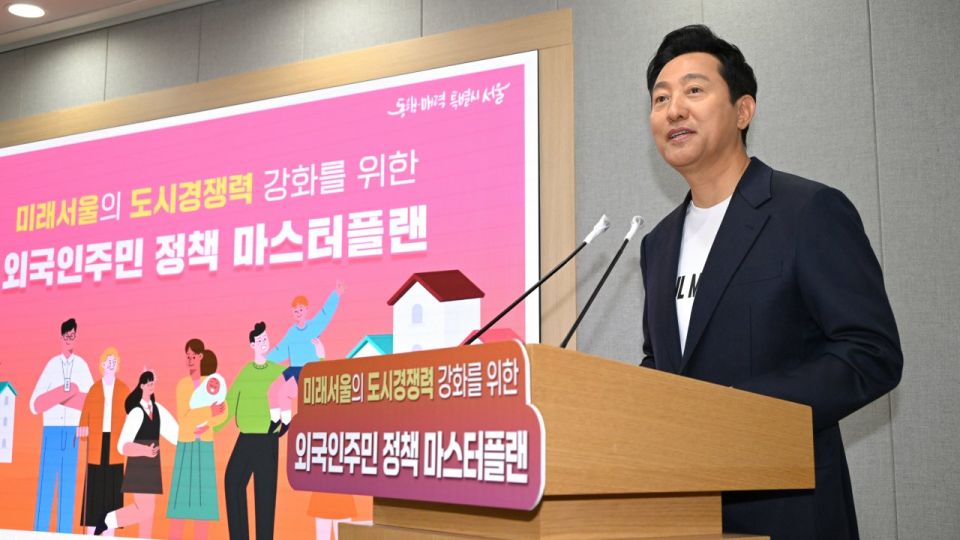May 21, 2024
SEOUL – The Seoul Metropolitan Government announced Monday its plans to invest 250.6 billion won ($184.8 million) over five years to attract foreign talent and businesses and to help them adjust to the city.
The plan, announced in a press briefing, comes amid an increase in the overall number of foreign nationals residing in the city. According to the city government, there are around 440,000 residents of foreign nationality, accounting for 4.7 percent of the city’s total population.
The city’s project is focused on attracting around 1,000 foreign nationals with master’s or doctoral degrees in science and engineering, in cooperation with top universities in Seoul, Oh Se-hoon, the city’s mayor said. Ten universities with majors in high-tech fields will be selected to receive financial support of up to 1.5 billion won annually for three years by 2025, he added.
“The key behind Seoul’s plan is to attract foreign talent and to create an inclusive, multicultural society to boost the city’s global competitiveness,” said Oh, during Monday’s press briefing.
“To make Seoul one of the top five global cities (in the Global Cities Index), Seoul must shape itself into an inclusive city that attracts foreign talent and companies while engaging with them to make the most of their ideas, capital and capabilities,” according to Oh. The Global Cities Index was created by Chicago-based global management consulting firm Kearney investigate cities’ “degree of globalization.”
Seoul will also establish a startup assistance center by 2030, to host over 100 overseas startup companies seeking to expand into Seoul and to broaden its market in Asia. It also aims to attract foreign direct investment and help students of foreign nationality in Seoul find jobs at startups and artificial intelligence firms or launch a startup company of their own. According to the city government, the assistance center will offer its services in both Korean and English.
Oh added that it will also begin to accept more foreign workers in jobs that are facing labor shortages, such as firms in care labor, child care, dining and hotel services.
Starting in September, the city government will launch a pilot program that introduces 100 domestic workers from the Philippines. The domestic housekeepers will earn up to 2.06 million won every month until February 2025, based on South Korea’s minimum wage for 2024, 9,860 won per hour, worked eight hours a day, five days a week.
From 2025, the city government aims to hire up to 500 domestic workers, and up to 1,000 by 2028.
The city government will also seek to attract people of foreign nationality to fill labor shortages in the care work sector in nursing hospitals. According to the city government, there are currently around 40,000 care workers employed in 1,481 nursing hospitals based in Seoul, with a shortage of a whopping 80,000.
Seoul will begin hosting study abroad fairs to draw more foreign national students, starting with Jakarta, Indonesia, in July and New Delhi, India, in December. It will also create a scholarship program, known as the Seoul Tech Scholarship, awarding 200 students from developing countries with up to 20 million won annually for five years.
To help foreign national residents adjust more smoothly to the city, Oh announced that they would be eligible for the same welfare benefits for pregnancy, childbirth and child care given to Korean nationals residing in the city.
Foreign national residents will also be able to receive home rental assistance for both monthly lease contracts and “jeonse,” or a lump-sum returnable housing deposits, for two years. Up to 414 real estate offices offering their services in English will be established by 2028, an increase from the 239 that exist currently.
Oh added that the city government will create a “global city policy office” to enhance the implementation of its five-year plan and to strategize effective policies for residents of foreign nationality in the city.
“The city government acknowledges that city dynamics are driven by creative talent from diverse cultural backgrounds,” said Mayor Oh. “Seoul will steadily prepare for a future of Seoul that attracts foreign talent and grows as a city in harmony with its citizens of foreign nationality.”
The plan comes amid a surge in the overall number of people of overseas nationality residing in the nation’s capital.
Of Seoul’s 25 districts, foreign national residents in Guro-gu, Geumcheon-gu and Yeongdeungpo-gu in western Seoul, as well as Jung-gu in central Seoul, make up for around 10 percent of these districts’ total populations, according to the city government.


